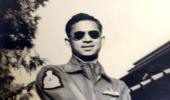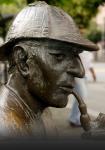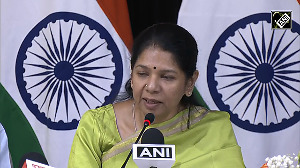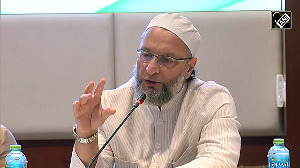Air Marshal Denzil Keelor was an Indian Air Force legend.
His nephew Basil Keelor, son of another war hero Wing Commander Trevor Keelor, remembers a remarkable officer and gentleman.

This month 49 years ago Indian Air Force fighter pilots Trevor and Denzil Keelor became household names in India.
Famously known as the 'Keelor Brothers', the pilots shot down superior Pakistani Sabre jets, 10 days apart, during the 1965 War.
The heroic feat won them the sobriquet 'Sabre-Slayers' and etched their names in history.
The brothers from Lucknow had studied at the same school, played on the same hockey team, joined the IAF together, flew the same aircraft, won gallantry medals in the same war -- and now rest in the same grave.
Wing Commander Trevor Keelor passed away, rather young at 68, in 2002.
Air Marshal Denzil Keelor died on August 29, 2024. He was 91.
"A notable thing about the funeral was that he was buried along with my father and mother in their grave. The Keelor Brothers now rest in the same grave," says nephew Basil Keelor, Wing Commander Trevor Keelor's son.
Air Marshal Denzil Keelor was a year older than Wing Commander Trevor Keelor.
"My father was buried in 2002, my mother in 2018; they are now joined by Denzil. They were all close friends throughout their lives and now lie together in their final rest," says Basil, a former marine engineer who has been working in senior positions in facilities management for many years.
Basil Keelor shared memories of his exceptional uncle and ace military pilot, with Rediff.com's Archana Masih.
"My dad and Denzil were wonderful athletes. While my father won all the short races, Denzil won all the middle and long distance ones. They were both boxers and hockey players.
They joined the IAF together and went to the air force academy together. When the Gnat was introduced, they were the first batch of IAF pilots who converted to the Gnats which was an unusual aircraft anywhere in the world.
The IAF was the only air force that flew the fighter version of the Gnat.
Many of their postings were in Ambala and we lived next door to each other.
We lived on 11, Durant Rd, Denzil on 12.
Both brothers also had a wonderful sense of humour.
I remember Denzil had once taken an interest in rearing chickens. He had a big hen coop and every night my father would slink in and steal the eggs. Denzil would be perplexed about the chickens not laying eggs till he caught my dad red handed one night!
In the 1965 War, they left home abruptly and were not allowed to tell us where they were going. We were living in the Ambala air force station and their squadrons were moved to other cities.
We knew something big was happening. We were advised to leave Ambala immediately because news was that Pakistan was going to drop its paratroopers there. The Pakistanis were expected to reach Ambala.
We left in the middle of the night for Delhi. My mother could barely drive and Marie [Denzil's wife] could not. We were cramped into a car and not allowed to use headlights.
There were so many rumours flying around during the war like my father and Denzil had been killed in action. The truth, as we all know, was quite the opposite.
My father had shot the first Pakistani Sabre jet on September 13 and 10 days later, Denzil shot another one down.
We only came to know all this after the war.
It was not a long war and our mothers may have been anxious, but we children had the time of our lives! We were staying in a hotel in Connaught Place and went up and down the lift the whole day till we broke it!
He and my father were a cut above the rest. I remember the times when we would go to the air force mess in the evenings. We kids used to sit in the lawn enjoying Coca Cola and chips which was a big thing in those days, while they would sit at the bar.
All the young pilots would crowd around them and they would talk about flying. They were obsessed with flying.

In the 1971 War, Denzil was flying the MiGs. He was among the first batch of IAF pilots to be sent to Russia to convert to the MiGs, and he really made the MiG-21 his own.
He was an absolute ace with that aircraft, but during the war, he was shot down by ground fire in the western sector. He ejected, but his legs got caught in the chords of the parachute. He hit the ground on his back and was paralysed.
He lay in no man's land. The Pakistanis had overrun that area and left him for dead.
When our troops retook the area, they found him and took him to hospital. It took him many months to recover, but he did because he was an extremely fit officer.
He was such a good athlete that till much later, he would go and play hockey with the men. His fitness helped him recover and he went back to active flying after the 1971 War.
The '71 war began much before the war actually started. My father was flying active sorties into East Pakistan. We were in Bagdogra during the war. One night after he was returning from night flying on his scooter, he was hit by a truck. He was stretchered out of Bagdogra and spent the war in the command hospital in Lucknow.
He went back to active flying after he recovered.
Subsequently, Denzil took over as commandant of TACDE [Tactics and Air Command Development Establishment] which is our Top Gun unit. He loved that type of flying and was posted to TACDE several times.
Of course, one of his exceptional postings was in Gwalior. He set up the base to induct the first Mirage 2000s into the IAF and left a lasting impression in the way he accomplished the task. Gwalior gave him a huge canvas to paint on. He was the first Air Officer Commanding of 40 Wing Squadron in Gwalior.
In fact, Denzil did good wherever he went.

After retirement, he became advisor to the DGCA and played a role in the setting up of the new airlines entering the Indian skies at that time. My father, of course, had retired much earlier.
Denzil was president of the YMCA for many years where he organised a boxing competition every year. The meet produced many good boxers, some of whom went on to win Commonwealth medals.
He was the head of the family and exemplified excellent judgement. I valued his opinion.
One day I asked him a question I had never asked my father.
'Where do you get courage from?' I asked.
He said the infantry were the brave ones -- men who fought in the trenches. Men who fought hand to hand. Men who saw their brothers in arms die beside them.
We are removed from that, he said. We don't feel fear because we are focused on the technicality of flying in the cockpit, applying every strategy we know to the extremes of endurance to get the best of the aircraft.
He lived for flying. For both he and my dad, that was their element. There was nothing beyond.
WATCH: Air Marshal Denzil Keelor's military funeral
On my last visit to Lucknow, I went to the railway station and took photographs of the plaque celebrating their heroics during the 1965 War. (The plaque was posted at the railway station of their hometown after the war.)
It was removed by the railways recently because it was worn out. We have been trying to get it put back, but haven't made much progress. It was special and should be put back.
In fact, Denzil had got a model of the Gnat delivered to La Martiniere College, their alma mater.
A plaque about the Keelor Brothers has been put up there which is very inspiring for the school boys."
- Also Read: A Salute To An IAF Legend
Feature Presentation: Aslam Hunani/Rediff.com











